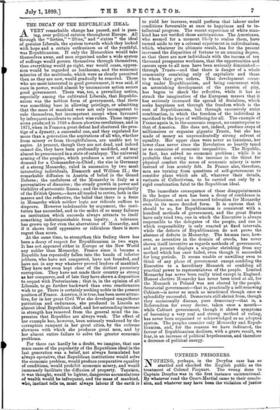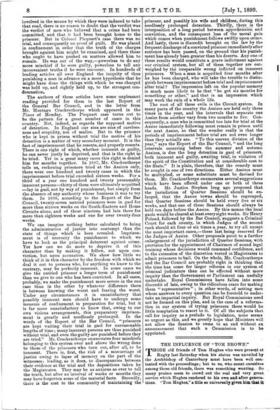UNTRIED PRISONERS.
NOTHING, perhaps, in the Dreyfus case has so startled and shocked the English public as the treatment of Colonel Picquart. The wrong done to Captain Dreyfus was in the first instance unintentional. By whatever road the Court-Martial came to their conclu- sion, and. whatever may have been the violation of justice involved in the means by which they were induced to take that road, there is no reason to doubt that the verdict was the verdict of men who believed that a crime had been committed, and that it had been brought home to the prisoner. But in Colonel Picquart's case there was no trial, and consequently no proof of guilt. He was placed in confinement in order that the truth of the charges brought against him might be examined, and there those who ought to have pushed on matters allowed him to remain. He was out of the way,—powerless to do any more mischief if he were guilty, powerless to tell any inconvenient truths if be were innocent. In hundreds of leading articles all over England the iniquity of thus punishing a man in advance on a mere hypothesis that he might have done the things with which he was charged was held up, and rightly held up, to the strongest con- demnation.
The authors of these articles have some unpleasant reading provided for them in the last Report of the General Bar Council, and in the letter from Mr. Montagu Crackenthorpe which appeared in the Times of Monday. The Picquart case turns out to be the pattern for a great number of cases in this country. Not, indeed, as regards the supposed motive of detention. In England our sins are sins of careless- ness and stupidity, not of malice. But to the prisoner who is kept in prison without trial the motive of his detention is a matter of very secondary moment. It is the fact of imprisonment that he resents, and properly resents. There is one right of which, whether innocent or guilty, he can never justly be deprived, and that is the right to be tried. Yet in a great many cases this right is denied him for months together. In 1897, Mr. Crackenthorpe tells us, reckoning prisoners tried at the Assizes only, there were one hundred and twenty cases in which the imprisonment before trial exceeded sixteen weeks. For a third of a year one hundred and twenty presumably innocent persons—thirty of them were ultimately acquitted —lay in gaol, not by way of punishment, but simply from the absence of any authority whose business it was to try them. In 1898, according to the Report of the Bar Council, twenty-seven untried prisoners were in gaol for more than sixteen weeks on the South-Eastern and Home Circuits alone, and of these nineteen had lain there for more than eighteen weeks and one for over twenty-four weeks.
We can imagine nothing better calculated to bring the administration of justice into contempt than the state of things which is here revealed. Imprison- ment is of necessity the punishment to which we have to look as the principal deterrent against crime. Yet how can we do more to deprive it of this character than by making it follow, not upon con- viction, but upon accusation. We show how little we think of it in this character by the freedom with which we deal it out to persons who, for anything we know to the contrary, may be perfectly innocent. In some cases we give the untried prisoner a longer term of punishment than we give to one who has been convicted. In all cases, probably, we make the punishment more severe in the one case than in the other by whatever difference there is between knowing the worst and fearing the worst. Under any circumstances it is unsatisfactory that possibly innocent men should have to undergo some measure of confinement in preparation for trial, but it is far more unsatisfactory to know that, owing to our own vicious arrangements, this preparatory imprison- ment is greatly and needlessly prolonged. In the words of the Report of the Bar Council, "prisoners are kept waiting their trial in gaol for unreasonable lengths of time ; many innocent persons are thus punished without trial, and even the guilty are punished before they are tried." Mr. Crackenthorpe enumerates four mischiefs belonging to this system over and above the wrong done to those of the prisoners who turn out, after all, to be innocent. There is, first, the risk of a miscarriage of justice owing to lapse of memory on the part of the witnesses ; leading, as it does, to discrepancies between their evidence at the trial -and the depositions taken by the Magistrates. They may be as anxious as ever to tell the truth, but after an interval of weeks or months they may have forgotten some of the material facts. Secondly, there is the cost to the community of maintaining the prisoner, and possibly his wife and children, during this needlessly prolonged detention. Thirdly, there is the interposition of a long period between apprehension and conviction, and the consequent loss of the moral gain which comes when punishment follOws swiftly upon crime. And lastly, there is discredit brought on the law by the frequent discharge of a convicted prisoner immediately after sentence has been passed, on the ground that his punish- ment has already been greater than his deserts. Any one of these results would constitute a grave indictment against our criminal system, but all of them together are out- weighed by the irreparable wrong inflicted on innocent prisoners. When a man is acquitted four months after he has been charged, who will take the trouble to distin- guish between imprisonment before trial and imprisonment after trial ? The impression left on the popular memory is much more likely to be that "he got six months for something or other," and that is an impression which may work the ruin of a whole life.
The root of all these evils is the Circuit system. In many parts of the country the Assizes are held only three times in the year, and the intervals that separate one Assize from another vary from two months to five. Con- sequently, a man who is committed too late for trial at the Assize immediately following must remain in prison until the next Assize, so that the wonder really is that the periods of imprisonment before trial are not even longer than they actually are. "To this uneven division of the year," says the Report of the Bar Council, "and the long intervals occurring before the summer and autumn Assizes, is due the long detention in gaol of prisoners, both innocent and guilty, awaiting trial, in violation of the spirit of the Constitution and at considerable cost to the State." It is plain, therefore, that the remedy must be sought in one of two directions. Either Assizes must be multiplied, or some substitute must be devised for them. Mr. Crackenthorpe enumerates several suggestions which have been offered under one or both of these heads. Mr. Justice Stephen long ago proposed that the jurisdiction of Quarter Sessions should be en- larged, that the Assize towns should be regrouped, that Quarter Sessions should be held every five or six weeks, and that one of these Sessions should always be held ten days before the Assize. By this means the local gaols would be cleared at least every eigh t weeks. Sir Henry Poland, followed by the Bar Council, suggests a Criminal Court for each county, in which Judges of the second rank should sit four or six times a year, to try all except the most important cases,—these last being reserved for the Judges of Assize. Other proposals point to a further enlargement of the jurisdiction of Quarter Sessions, with provision for the appointment of Chairmen of sound legal training whose decisions would command confidence, and to the extension of the discretion vested in Magistrates to admit prisoners to bail. On the whole, Mr. Crackenthorpe and the Bar Council are probably right in thinking that the time has come for larger reforms in our system of criminal judicature than can be effected without more inquiry than the Government or Parliament can usefully undertake. Royal Commissions have fallen into some discredit of late, owing to the ridiculous craze for making them " representative " ; in other words, of setting men whose answers to every question can be foretold to under- take an impartial inquiry. But Royal Commissions need not be formed on this plan, and in the case of a reforma- tion in our system of trying prisoners there would be little temptation to resort to it. Of all the subjects that call for inquiry as a prelude to legislation, none seems so urgent as this, and we greatly hope that Ministers will not allow the Session to come to an end without an announcement that such a Commission is to be appointed.
















































 Previous page
Previous page